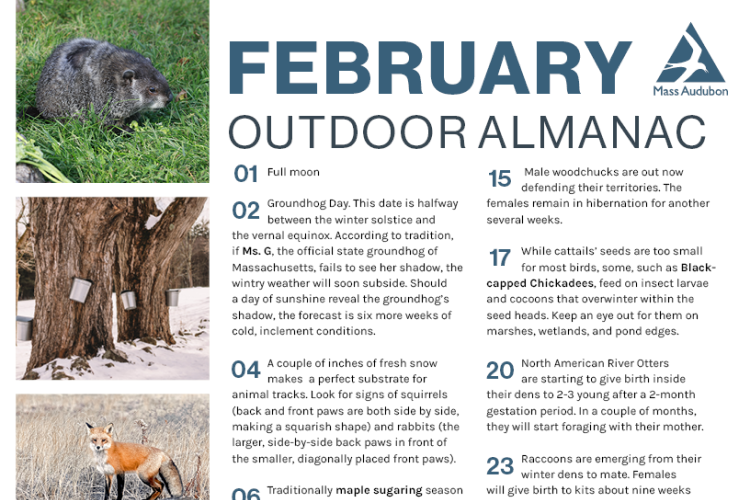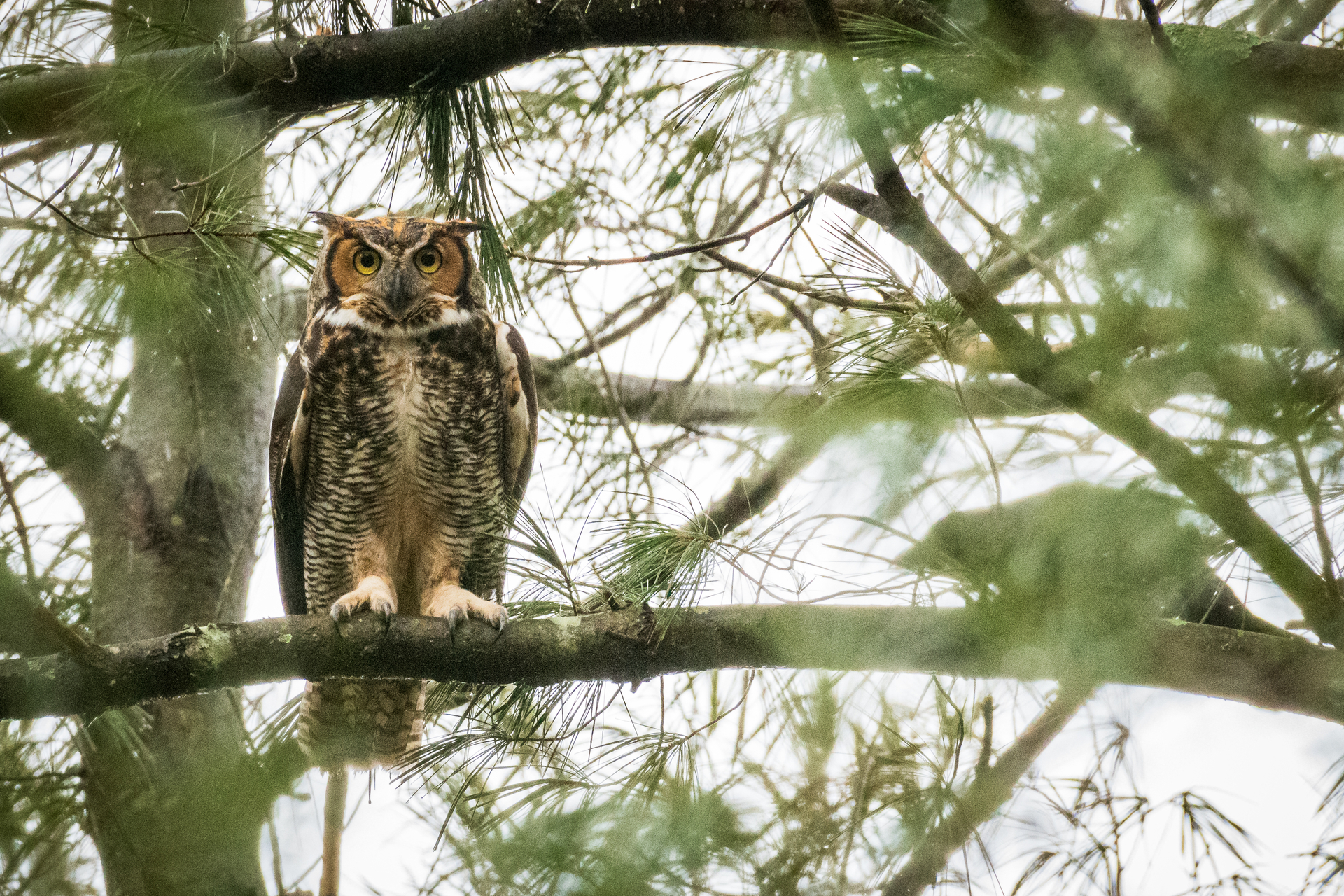Outdoor Almanac
February may feel like the quiet heart of winter, but the natural world is full of subtle change. As snow reveals animal tracks, owls begin nesting, and foxes scout dens, small signs of the season ahead begin to emerge. Beneath winter’s calm, life is quietly preparing for what comes next, offering moments of discovery for those who take the time to look and listen. Step outside, slow down, and uncover the stories February has to share.
What will you discover this February? Visit a nearby wildlife sanctuary or join us for a program to make the most of your month.

Outdoor Almanac
Download or print this month's outdoor almanac.
FEBRUARY
1
Full moon
2
Groundhog Day. This date is halfway between the winter solstice and the vernal equinox. According to tradition, if Ms. G, the official state groundhog of Massachusetts, fails to see her shadow, the wintry weather will soon subside. Should a day of sunshine reveal the groundhog’s shadow, the forecast is six more weeks of cold, inclement conditions.
4
A couple of inches of fresh snow makes a perfect substrate for animal tracks. Look for signs of squirrels (back and front paws are both side by side, making a squarish shape) and rabbits (the larger, side-by-side back paws in front of the smaller, diagonally placed front paws).
6
Traditionally maple sugaring season began in mid-late February, given periods of warmer days and cold nights that produce strong sap flow. With climate change, our season has become erratic and can start as early as mid-late January. Watch for little icicles at the tips of sugar maple twigs that signal flow has started.
9
Red Fox vixens scout and clean out several potential dens to choose from before they are ready to give birth. Look for piles of freshly excavated soil on top of the snow in edge habitats along gentle hillsides.
10
Great Horned Owls lay 1-4 eggs, often in nests that were built and abandoned by other species such as Great Blue Herons or Red-tailed Hawks.
14
Striped Skunks are not true hibernators, but they spend much of the winter sleeping. They emerge to mate about this time of year, which also makes them liable as prey for their major predator. If you’re out in the woods and you smell a skunk overhead, it’s most likely a Great Horned Owl.
15
Male woodchucks are out now defending their territories. The females remain in hibernation for another several weeks.
17
While cattails’ seeds are too small for most birds, some, such as Black-capped Chickadees, feed on insect larvae and cocoons that overwinter within the seed heads. Keep an eye out for them on marshes, wetlands, and pond edges.
20
North American River Otters are starting to give birth inside their dens to 2-3 young after a 2-month gestation period. In a couple of months, they will start foraging with their mother.
23
Raccoons are emerging from their winter dens to mate. Females will give birth to kits about nine weeks later. These animals are synanthropes, or animals that benefit from human-created environments.
26
Listen for the peter, peter song of male Tufted Titmice. Titmice have many different calls that can be difficult to identify, but the distinctive repetitive mating song is a herald of the changing seasons.
28
Red-winged Blackbirds are returning. The males come back first to display their red epaulets and sing their konk-a-ree songs as they establish territories before the females arrive.
Upcoming Programs this Month
See MoreThe Nest Nature Journal Club
-
Museum of American Bird Art Education Center, Canton
-
Saturday, February 21
11:30am-1:30pm
Adults
Fish Feeding Fun and Story Time
-
Wellfleet Bay Wildlife Sanctuary, South Wellfleet
-
Saturday, February 21
11:30am-12:30pm
Adults & Families - 2 - 17
Nature Detectives: An Animal Whodunit
-
Arcadia Wildlife Sanctuary, Easthampton
-
Saturday, February 21
12:00-1:30pm
Families - children 5 - 10 years
Starlight and S'Mores
-
Wachusett Meadow Wildlife Sanctuary, Princeton
-
Saturday, February 21
90-minute sessions from 5:00-8:00pm
Adults & Families - 0 - 17
Nature Time: Tracks and Traces
-
Museum of American Bird Art Education Center, Canton
-
Monday, February 23
11:00-11:45am
Families - children 2 - 3 years
Nature Time: Tracks and Traces
-
Museum of American Bird Art Education Center, Canton
-
Monday, February 23
1:00-1:45pm
Families - children 2 - 6 years
Stay Connected
Don't miss a beat on all the ways you can get outdoors, celebrate nature, and get involved.



